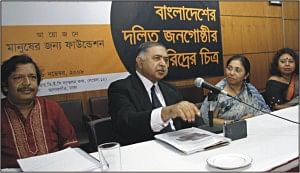Dalits subjected to serious human rights violations

Eminent jurist Dr Kamal Hossain speaks at a seminar on poverty profile of Dalits in Bangladesh at LGED auditorium in the city yesterday. On his right is Prof Mesbah Kamal and on his left are Shaheen Anam and Meghna Guhathakurata. Manusher Jonno Foundation organised the seminar. Photo: STAR
Rekha Ali Basko cannot forget the days when she was not allowed to drink water with the glass used commonly by others at her school as she was born in a Harijon family.
"My classmates used to ask me to bring glass from my house because they considered me a member of a lower caste which is untouchable," said Rekha, a young lady from Narsingdi, at a seminar on Dalits organised by Manusher Jonno Foundation (MJF) at LGED auditorium in the city.
“Dalits are regarded as untouchables. They are deprived of opportunities for being integrated into the mainstream of the society,” says a study.
Members of Harijon, Robidas, Jolodas, Nomoshudra, Dhopa, Bormon, Bagdi, Kaiputra, Kornidas, Malo, Maimol, Bahera, Rajbongshi and Rishi communities are known as Dalit.
There are around 46 lakh people of Dalit community in the country, according to the study titled 'Poverty profile of the Dalits in Bangladesh' which was presented by Prof Mesbah Kamal of Dhaka University at the seminar.
"As we are considered low caste, enumerators do not come to our houses to register us as voters. We are not even included when census is done," said Rekha now working with Chinishpur Deepshikha Women's Association.
Ratan, who hails from Tala in Satkhira, said, "I am now a teacher although my forefathers worked as cobblers. But still when students come to me for tuition, they are discouraged by others."
Elaborating the feeling of Ratan, Bangladesh Harijon Oikya Parishad Secretary General Nirmal Chandra Das said members of Harijon community are now caught in a dilemma because many of them are receiving education but they are not getting jobs as expected.
"They can neither return to their traditional occupations, nor getting mainstream jobs due to social discrimination," he said, adding that the governments pay no attention to them.
Dalit leaders said it is time to get united to stop all sorts of discrimination. Rabi Harijon from Balubari of Dinajpur shared a success story of their united movement at the seminar.
"In 2003, a hotel refused to sell food to a boy of Harijon community in Dinajpur when her mother was sick. On information, we all the Harijons took to the streets and strongly protested it. The hotel management was then compelled to allow us in the hotel," said Rabi.
"Here lies the strength," said eminent jurist Dr Kamal Hossain, adding that Bangladesh was born through a struggle against all sorts of social, economic and political discrimination and it must be upheld by any means.
Speaking as chief guest at the seminar, Dr Kamal said Dalits are subjected to serious human rights violations, but the good news is that these people are raising their voices to establish their rights.
He said the political parties should specifically declare the initiatives that they want to take to improve the lot of Dalits if they are voted to power.
Prof Mesbah in his study said the annual income of most of the Dalit communities ranges from Tk 14,000 to Tk 27,000 and major portion of their income is spend for food.
"Their housing, educational and health status is horribly poor," he said, adding that with skyrocketing prices of essentials, these people are getting poorer day by day.
"In a free and modern state, discrimination against the Dalits is never acceptable. We must try to remove the discriminations for an inclusive society," said MJF Executive Director Shaheen Anam while presiding over the seminar.
Executive Director of Research Initiatives Bangladesh Meghna Guhathakurata, Dhaka University Anthropology Professor Dr HKS Arefin and Dalit Empowerment Foundation Executive Director Ashok Das also spoke.

 For all latest news, follow The Daily Star's Google News channel.
For all latest news, follow The Daily Star's Google News channel. 



Comments